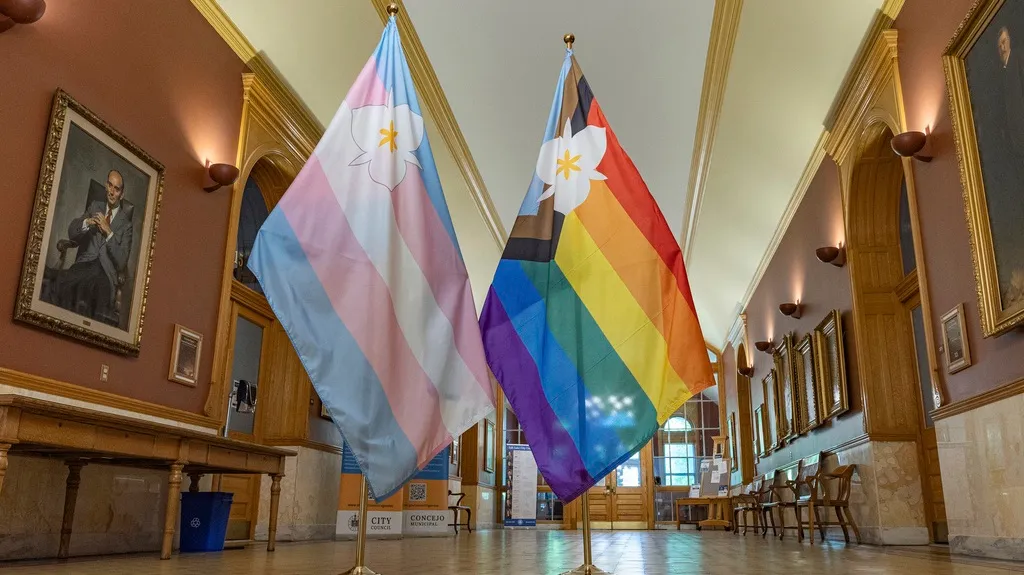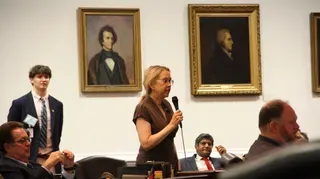December 15, 2010
Gay Soccer Fans Warned Off Sex
Kilian Melloy READ TIME: 5 MIN.
Gay soccer fans thinking about attending the World Cup in Qatar in twelve years were jokingly warned off any plans to have sex while in that nation by the head of F�d�ration Internationale de Football Association (FIFA).
FIFA officials determined on Dec. 2 that Qatar would host the 2022 World Cup match. When asked whether he had any concerns over cultural conflicts between the nation, a monarchy where Islamic law holds sway, and gay Western soccer fans, FIFA president Sepp Blatter quipped that gays heading to the event "should refrain from any sexual activities" while in Qatar, reported the BBC on Dec. 14. Blatter then said that because the sport transcends national and cultural boundaries, he foresaw "no problems" in 2022.
"You see in the Middle East the opening of this culture, it's another culture because it's another religion, but in football we have no boundaries," said Blatter, reported British newspaper the Guardian on Dec. 14. "We open everything to everybody and I think there shall not be any discrimination against any human beings be it on this side or that side, be it left, right or whatever."
But Blatter's paean to unity through sports was forgotten in light of his jocular initial response, which instantly sparked outrage and led to calls for Blatter to apologize or to step down. Openly gay retired NBA athlete John Amaeche slammed the comment, saying, "The position adopted regarding LGBT fans who would pay the enormous ticket and travel prices to attend the World Cup in 2022 should have been wholly unacceptable a decade ago. Instead, with little more than an afterthought, FIFA has endorsed the marginalization of LGBT people around the world.
"Anything less than a full reversal of his position is unacceptable and if the FA and football and sporting associations around the world fail to acknowledge this insult, they too will be complicit," added Amaeche. "If sport can not serve to change society, even temporarily during the duration of an event like the World Cup that invites the world to participate, then it is little more than grown men chasing a ball and we should treat it as such."
Amaeche told the BBC in a radio interview that Blatter's comment was "absurd," the BBC article reported. The American basketball star, who is the American=born son of an English mother and a Nigerian father, went on to denounce the comment in the context of a recent U.N. vote that removed protections for gays from a resolution condemning extralegal executions. Amaeche also pointed to GLBT youth as a population vulnerable to anti-gay commentary, even if made in jest.
"It's not about people having sex in public and being sanctioned for it, it's the fact that Qatar was one of 79 countries to sanction executing gays at the United Nations," Amaeche said, going on to register displeasure at "the giggling of grown men, sports reporters, and members of FIFA, on this issue," and noting that, "when asked a perfectly simple and reasonable question given the worries about Qatar... the whole room burst into laughter. It is the most childish response I could imagine."
Added the basketball legend, "You have to understand that this story is big enough, [Blatter's] influence is big enough, to impact young people in school, people in workplaces, anybody who is perceived to be gay or is gay, [who] hears these comments and once again realizes that the seat of power--straight white men normally--are very, very clearly uncomfortable with this issue, and certainly not interested in taking it seriously."
The choice of Qatar for the 2022 championship series signifies the first time the World Cup will be hosted in the Middle East, the BBC noted. Concerns about the climate, as well as Islamic law--the consumption of alcohol is forbidden--had also been raised, but the issue of gay fans was particularly sensitive because some Islamic nations punish homosexuality severely.
"Many LGBT people live in countries where they would face execution or imprisonment if discovered," said the chair of the Gay Football Supporters' Network (GFSN), Chris Basiurski. "These people deserve our help, our respect and our support. They, like the rest of us, do not deserve to be laughed at.
"Mr. Blatter should retract his remarks and apologize immediately. Otherwise, he should reconsider his position and resign," Basiurski went on, adding, "Mr. Blatter is naive to think that by taking the beautiful game to Qatar, it will bring an end to discrimination in the Middle East. He says that football is 'everything for everyone,' but he has not yet explained just how FIFA is going to ensure that LGBT football players and supporters will be welcome in Qatar."
Blatter indicated a belief that in twelve years, gay fans should have few difficulties in Qatar. "If they want to watch a match somewhere in Qatar 2022, I'm sure they will be admitted to such matches," he stated. "I think there is too much concern for a competition that will be done only in twelve years."
But others see the state of the sport as persistently homophobic. In a separate Dec. 14 Guardian article, sports writer Richard Williams lamented how little progress had been made in the soccer world when it comes to acknowledging and celebrating gay players and fans.
"Somewhere in one of the bigger European leagues is a gay footballer," wrote Williams, "a wonderfully gifted player, popular with his club's supporters, an international who has appeared in World Cups and is at an age when the best years of his career almost certainly still lie ahead of him. But, of course, his sexuality remains a secret to the world at large."
Williams decried the locker room's "age old... culture of empty machismo" and homophobia among fans, and went on to add, "The player concerned--and you will have to take it from me that he really does exist--has it in his power to change all this. His prominence means that were he to speak publicly about his sexuality, notice would be taken around the world. And we would all, I believe, be surprised by the results."
Williams cited the example of openly gay British rugby player Gareth Thomas, who came out publicly in a newspaper interview late last year. "As far as one can see, his decision has brought him nothing but acceptance and admiration from the outside world," wrote Williams.
But by contrast, Williams also wrote of Justin Fashanu, a soccer player who came out in 1990, only to be disowned by his brother, derided by fellow athletes, and mocked by fans. "The sad chaos of Fashanu's life, which ended by his own hand in 1998 at the age of 37, can be gauged by the list of clubs attached to his name," wrote Williams. "There were 22 in 19 years as his career spiraled out of control. Now there is an organization called the Justin Campaign, which campaigns against the game's institutionalized homophobia."
Added Williams, "The special prominence of football in global culture gives it an unusual degree of influence. Currently it remains one of the last significant bastions of prejudice against gays, and were the footballer I mentioned earlier to decide to declare himself, no doubt he would need quite as much courage as Gareth Thomas showed."
Kilian Melloy serves as EDGE Media Network's Associate Arts Editor and Staff Contributor. His professional memberships include the National Lesbian & Gay Journalists Association, the Boston Online Film Critics Association, The Gay and Lesbian Entertainment Critics Association, and the Boston Theater Critics Association's Elliot Norton Awards Committee.







